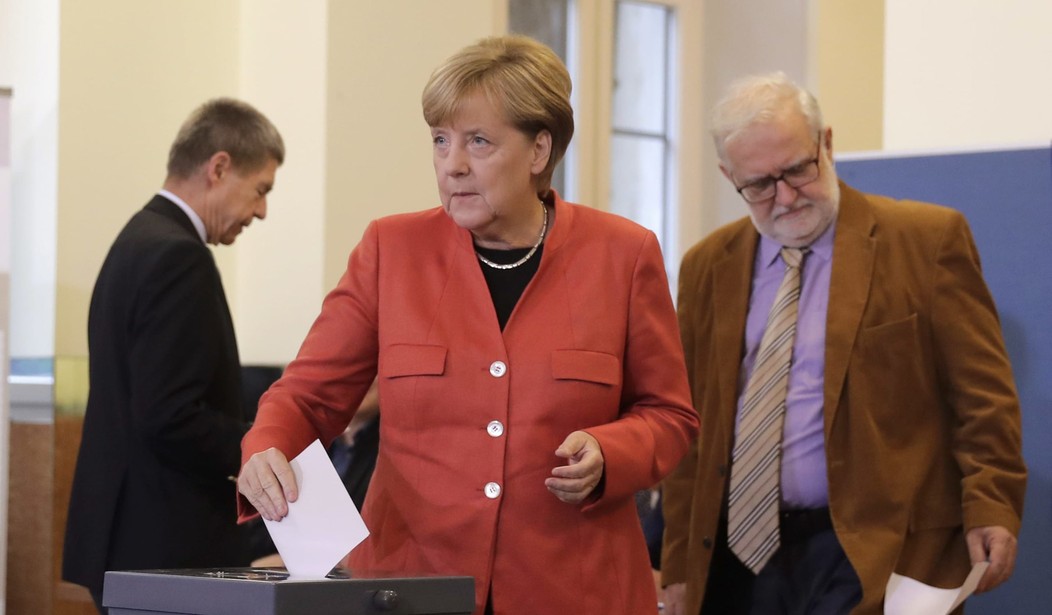The collapse overnight of negotiations to form a new German government is yet another shock to the liberal world order, not of the same magnitude as the Brexit vote or the U.S. presidential election, but of the same character. Chancellor Angela Merkel’s tenure in office is now in jeopardy. After failing to form a coalition between the odd trio of Christian Democrats, Free Democrats and Greens, Merkel may have to call new elections, which are likely to produce the same intractable stalemate as before. There are many ways in which the deep division in German opinion about the migrant flood might be papered over–Merkel’s partners in the outgoing government, the Social Democrats, could change their mind and remain in a coalition with the Christian Democrats–but the crack in German society has been exposed and will only deepen in the future.
The migrant issue is the elephant in Merkel’s parlor. The Christian Democrat-Social Democrat coalition was Germany’s equivalent of Washington’s Swamp Fusion Party and tolerated no criticism of Merkel’s decision to let almost a million and a half migrants (some of whom actually were Syrian war refugees) into Germany during 2016 and 2017. A protest vote brought smaller parties into the Bundestag on an anti-migrant platform; in Germany’s eastern half, the Alternative für Deutschland swept the ballots, and in the West, the small Free Democrats won votes on a platform of tax cuts, reducing immigration, and skepticism about Euro bailouts of Greece and Spain. The Social Democrats imploded while the Christian Democrats lost ground.
Merkel has barely a third of the votes in the Bundestag, and the Social Democrats withdrew from the coalition negotiations after their election debacle. Merkel won’t negotiate with the Alternative für Deutschland, which is crawling with anti-American ultra-nationalists with a whiff of Nazi sulphur about them. That left the Free Democrats and the Greens, who want to extend immigration rights not only to the migrants who stormed Germany’s borders a year and a half ago, but also to their families.
Merkel was caught between an extreme leftist party that is more concerned about destroying Germany’s national character than it is about limiting carbon emissions, and a conservative small party that drew votes by fighting Merkel on immigration. And Merkel’s Bavarian partners, the Christian Social Union, face a voter revolt over immigration that might cost them their majority in their home state in next year’s state elections.
Unlike many of my conservative friends, I thought Merkel the lesser evil (“A deplorable vote for Angela Merkel,” February 2017). Merkel is an American ally; whoever might replace her will be more eager to cut deals with Russia. Perhaps at some future date the Alternative für Deutschland might become part of a natural majority along with the Christian Democrats and Free Democrats, but it first needs to purge leaders like its Vice-Chairman Alexander Gauland, a Putin crony who thinks Americans are “a people thrown together at random without their own culture.” There are some very good people in the second-tier leadership of the Alternative party, but they have their work cut out for them.
In the end, Merkel couldn’t pull it off. Too many voters supported smaller parties who refused to indulge her sentimental humanitarianism at the expense of German’s national identity–whatever that might be. Thirty-six percent of German residents under the age of five are migrant children, and Germans are understandably alarmed.
A great deal of the present problem is the result of Merkel’s incompetence. Nearly 300,000 Bulgarians and Romanians entered Britain in 2015 right after their countries joined the European Community. That explains a great deal of the Brexit vote. The Germans suffer from a massive labor shortage, especially in the construction industry, and the Eastern Europeans might have helped. The Germans would not have objected to European immigrants who can assimilate into their society as much as they do to Muslims who cannot. The European Community’s blanket policy of free migration among its members makes it extremely difficult to manage immigration even when it might be beneficial rather than burdensome.
Now Germany is split between ordinary citizens who want to hold on to some notion of German-ness, even if they are not quite sure what that means, and those who want to liquidate German culture as a remedy for war guilt. A natural conservative majority exists in theory, but does not exist in practice because no German party can articulate a coherent, let alone an acceptable, message of German particularism. I do not anticipate a good outcome from this polarization. It is nonetheless instructive that even the long-suffering Germans do not want to be Guinea pigs for globalism.










Join the conversation as a VIP Member